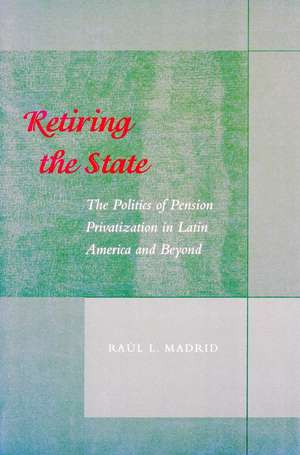Retiring the State: The Politics of Pension Privatization in Latin America and Beyond
Autor Raul Madriden Limba Engleză Paperback – 27 iul 2003
In the 1990s, numerous Latin American nations privatized their public pension systems. These reforms dramatically transformed the way these countries provide retirement income, and they provoked widespread protests from workers and pensioners alike. Retiring the State represents the first book-length study of the origins of this surprising trend.
Drawing on original field research, including interviews with key policymakers, Madrid argues that the recent reforms were driven not by social policy, but by macroeconomic concerns. Countries facing growing financial pressures chose to privatize their pension systems largely to boost their domestic savings rates and reduce public pension spending in the long run. The author explores his arguments through detailed case studies of pension reform in Argentina, Brazil, and Mexico, a survey of social security privatization efforts in East Europe and Latin America as a whole, and a quantitative analysis of pension privatization worldwide.
Drawing on original field research, including interviews with key policymakers, Madrid argues that the recent reforms were driven not by social policy, but by macroeconomic concerns. Countries facing growing financial pressures chose to privatize their pension systems largely to boost their domestic savings rates and reduce public pension spending in the long run. The author explores his arguments through detailed case studies of pension reform in Argentina, Brazil, and Mexico, a survey of social security privatization efforts in East Europe and Latin America as a whole, and a quantitative analysis of pension privatization worldwide.
| Toate formatele și edițiile | Preț | Express |
|---|---|---|
| Paperback (1) | 262.94 lei 3-5 săpt. | |
| Stanford University Press – 27 iul 2003 | 262.94 lei 3-5 săpt. | |
| Hardback (1) | 886.47 lei 6-8 săpt. | |
| Stanford University Press – 29 iul 2003 | 886.47 lei 6-8 săpt. |
Preț: 262.94 lei
Nou
Puncte Express: 394
Preț estimativ în valută:
50.31€ • 54.82$ • 42.40£
50.31€ • 54.82$ • 42.40£
Carte disponibilă
Livrare economică 02-16 aprilie
Preluare comenzi: 021 569.72.76
Specificații
ISBN-13: 9780804747073
ISBN-10: 0804747075
Pagini: 336
Dimensiuni: 152 x 229 x 18 mm
Greutate: 0.45 kg
Ediția:1
Editura: Stanford University Press
Colecția Stanford University Press
ISBN-10: 0804747075
Pagini: 336
Dimensiuni: 152 x 229 x 18 mm
Greutate: 0.45 kg
Ediția:1
Editura: Stanford University Press
Colecția Stanford University Press
Recenzii
"[Madrid] demonstrates a mastery of the relevant empirical material, and he makes a convincing case that the causes of pension reform in Latin America are different from the causes of welfare reform more generally."—American Journal of Sociology
"Madrid demonstrates a deep knowledge of the literature; uses a sophisticated methodology; treats the subject in a comprehensive, comparative, systematic, and analytical manner; and arrives at reasonable conclusions based on solid evidence....[an] excellent book..."—Governance
"It is hard not to walk away impressed with the breadth of scholarship in Retiring the State"—Comparative Politics
Notă biografică
Raúl L. Madrid is Assistant Professor of Government at the University of Texas, Austin.
Textul de pe ultima copertă
"[Madrid] demonstrates a mastery of the relevant empirical material, and he makes a convincing case that the causes of pension reform in Latin America are different from the causes of welfare reform more generally."—American Journal of Sociology
“Madrid demonstrates a deep knowledge of the literature; uses a sophisticated methodology; treats the subject in a comprehensive, comparative, systematic, and analytical manner; and arrives at reasonable conclusions based on solid evidence....[an] excellent book...”—Governance
“Madrid demonstrates a deep knowledge of the literature; uses a sophisticated methodology; treats the subject in a comprehensive, comparative, systematic, and analytical manner; and arrives at reasonable conclusions based on solid evidence....[an] excellent book...”—Governance












